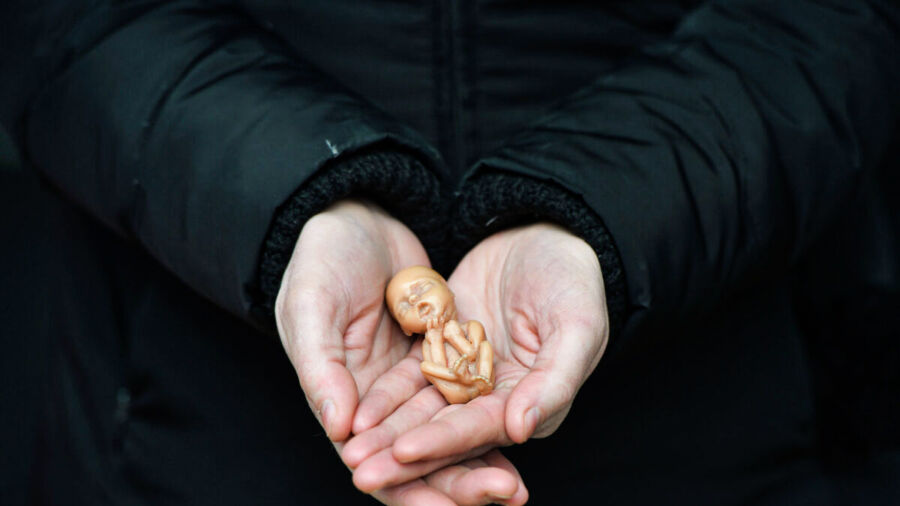A Kansas judge on Monday put a new state law on medication abortions on hold while also blocking older restrictions that instructed providers on what information they need to provide those seeking an abortion and requirements that women wait 24 hours to end their pregnancies.
The move is considered a major win for the pro-abortion industry as District Judge K. Christopher Jayaram ruled in favor of the Planned Parenthood lawsuit, Hodes & Nauser v. Kobach.
The law that halted abortion for 24 hours has been in place since 1997.
Kansas passed a law in August 2022 that granted abortion access statewide, basing it on the state’s constitution.
“The Court has great respect for the deeply held beliefs on either side of this contentious issue,” Judge Jayaram wrote in his 92-page order.
“Nevertheless, the State’s capacity to legislate pursuant to its own moral scruples is necessarily curbed by the Kansas Constitution and its Bill of Rights,” he said.
Judge Jayaram concluded that the restrictions now on hold violate a patient’s right to bodily autonomy.
The judge also ruled that they violated doctors’ free speech rights by giving doctors “no discretion” to omit any of the material mandated by the state.
“In addition, there is no credible evidence that the mandatory delays imposed by the Act for arbitrary periods of time are likely to, in fact, improve either the consent/decision-making process by pregnant patients or conduct by the medical profession,” he wrote.
The judge’s order is to remain in effect through the trial set for the end of June 2024 for a lawsuit filed by abortion providers against state officials who would enforce abortion restrictions.
Pro-life groups have long opposed the rationale of bodily autonomy, as it fails to consider that a separate human being is being created inside the womb.
The blocking of informed consent laws has also been met with opposition, with information that had been required to be given to women seeking abortion in Kansas, including “the probable anatomical and physiological characteristics of the fetus at the time the abortion is to be performed,” according to the ruling.
“These kinds of informed consent laws reflect the long-standing will of the people of Kansas, but Planned Parenthood challenged the law because it impacted their bottom line,” said Caleb Dalton, senior counsel for the pro-life group Alliance Defending Freedom.
“Planned Parenthood has made it clear that its goal is to withhold information from women, bypass ultrasounds, and refuse to meet with women before an abortion,” Mr. Dalton said.
“Kansans are right to want to protect maternal health and safety and the lives of the unborn, and we will continue defending their interests.”
Outlier on Abortion
Kansas has been an outlier on abortion among states with Republican-controlled legislatures.
The state Supreme Court declared in 2019 that the Kansas Constitution protects access to abortion as a “fundamental” right. GOP lawmakers proposed an amendment to the state constitution to declare that it doesn’t grant a right to abortion—and in the August 2022 vote, that ballot initiative lost by a wide margin, upholding abortion rights.
Republican lawmakers argued this year that “reasonable restrictions” should exist. A law that took effect July 1 required abortion providers to tell women that a medication abortion can be stopped using a certain drug. The state agreed not to enforce it until another ruling from Judge Jayaram, which seems unlikely.
Increase in Abortions
Kansas abortion providers said that challenging older restrictions became more compelling as other states banned abortion and out-of-state residents requested appointments. Kansas saw a 57 percent increase in abortions in 2022, according to state health department data.
Pro-life supporters argued repeatedly before the August 2022 vote that without a change in the state constitution, all existing abortion restrictions could be at risk.
The state Supreme Court is reviewing a 2015 law banning the most common second-trimester procedure and a 2011 law imposing tougher health and safety requirements only for abortion providers. Neither has been enforced because of the litigation.
Attorneys for the state and the Alliance for Defending Freedom argue that in suing the state this year, providers are working against the women’s interest in having as much information as possible.
“This is a nightmare for women and a dream come true for the profit-driven abortion industry,” Danielle Underwood, spokesperson for Kansans for Life, said in a statement.
In 2023, Kansas passed a bill to protect infants born alive after a failed abortion procedure. This bill was vetoed by the governor but was overridden with bipartisan support in both chambers, according to Kansans for Life.
After the U.S. Supreme Court’s decision in Dobbs v. Jackson in June 2022 ended protections for abortion and allowed states to ban abortion, legal battles in many states have occurred between pro-life advocates and the abortion industry.
In Texas, a judge ruled in August that the state’s ban was too restrictive, and the Utah Supreme Court heard arguments on whether it should lift a hold on a state law banning most abortions.
The Associated Press contributed to this report.


